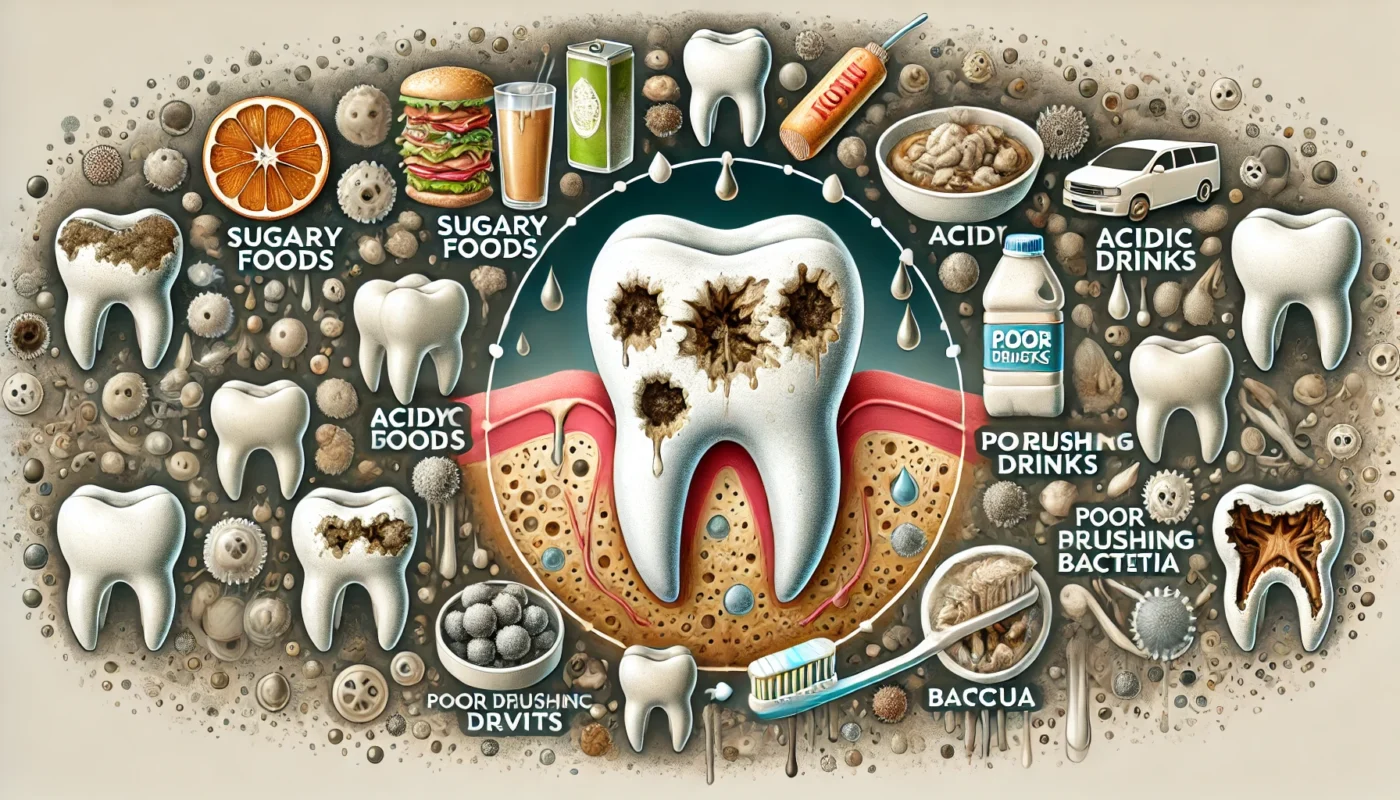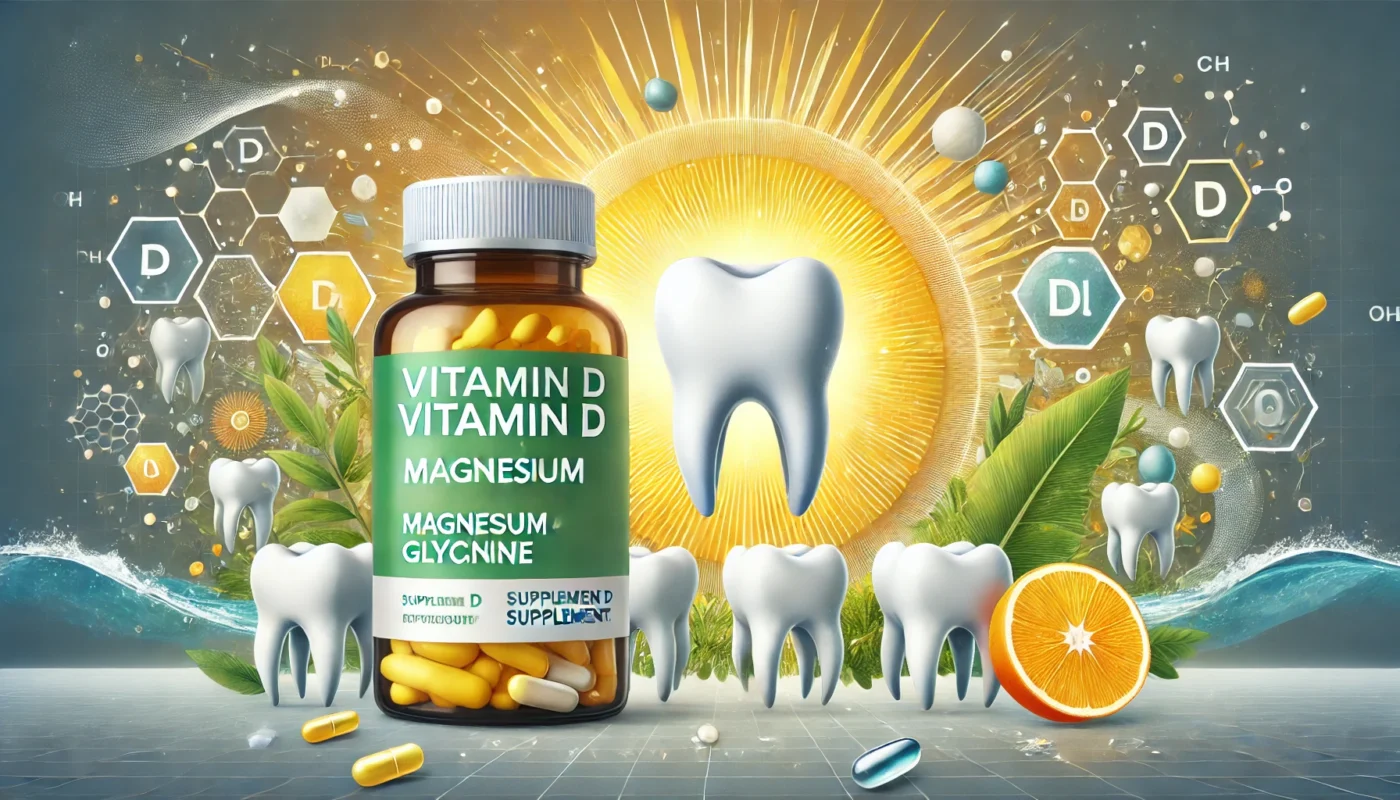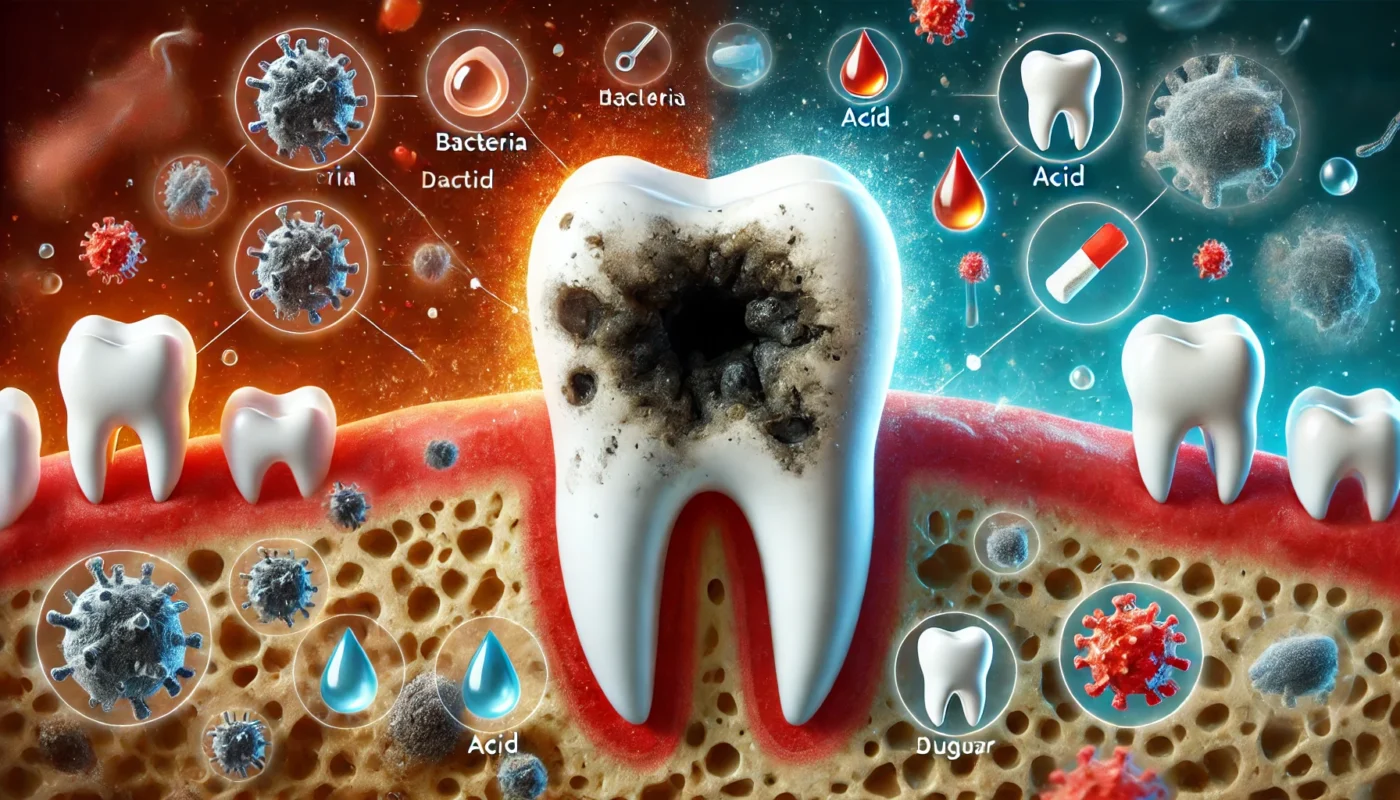Dental caries, commonly known as cavities, is one of the most prevalent chronic diseases worldwide, affecting individuals across all age groups. According to the World Health Organization (WHO), nearly 2.3 billion people experience caries in their permanent teeth, with millions more affected in primary teeth. Dental caries is characterized by the progressive destruction of tooth enamel and dentin due to acid-producing bacteria. This article provides an in-depth analysis of dental caries, covering its symptoms, causes, treatment strategies, and steps for prevention. Additionally, we will explore how certain nutritional supplements can play a supportive role in managing and preventing dental caries.
You May Also Like:
What is Dental Caries?
Dental caries is a preventable oral disease that results from the interaction between dietary sugars, oral bacteria, and host factors like saliva and tooth structure. When bacteria metabolize sugars, they produce acids that erode the tooth’s hard surfaces, leading to decay. Over time, untreated caries can cause severe damage to the tooth, resulting in pain, infection, and tooth loss. The process occurs in stages:
- Demineralization of Enamel: The earliest stage, where acids begin breaking down minerals in the enamel, creating white spots or lesions.
- Cavitation of Enamel: The continued breakdown leads to small holes forming in the enamel.
- Dentin Decay: As the decay progresses, it penetrates the softer dentin layer beneath the enamel, causing sensitivity and pain.
- Pulp Involvement: Severe decay reaches the pulp, which contains nerves and blood vessels, leading to inflammation, infection, and abscess formation.

Symptoms of Dental Caries
The symptoms of dental caries vary based on the extent of decay. Common indicators include:
- White Spots: The earliest visible sign, indicating enamel demineralization.
- Tooth Sensitivity: Pain or discomfort when consuming hot, cold, sweet, or acidic foods.
- Toothache: Persistent pain or intermittent discomfort, especially as the cavity deepens.
- Visible Cavities: Dark spots, pits, or holes on the tooth surface.
- Discoloration: Brown, black, or gray staining in areas affected by decay.
- Swelling or Abscesses: Advanced decay may cause swelling, pus, or abscess formation near the tooth.
Causes of Dental Caries
Dental caries is a multifactorial disease influenced by a combination of factors:
1. Bacterial Activity
Oral bacteria, particularly Streptococcus mutans and Lactobacillus species, play a central role in caries development. These bacteria ferment dietary carbohydrates to produce acids that demineralize tooth enamel.
2. High Sugar Intake
A diet rich in sugars and refined carbohydrates significantly increases the risk of dental caries. A study published in Community Dentistry and Oral Epidemiology (2018) found a direct correlation between sugar consumption and caries prevalence in children and adults.
3. Poor Oral Hygiene
Inadequate brushing and flossing allow plaque to accumulate on teeth. Plaque harbors bacteria, contributing to acid production and enamel erosion.
4. Salivary Deficiency
Saliva neutralizes acids and aids in remineralization. Conditions like xerostomia (dry mouth), often caused by medications or systemic diseases, reduce saliva flow and increase caries risk.
5. Genetics
Individual susceptibility to dental caries can be influenced by genetic factors, including enamel composition and salivary flow rates.
6. Socioeconomic Factors
Limited access to dental care and oral health education contributes to higher rates of dental caries, particularly in low-income populations.

Treatment Options for Dental Caries Recovery
The treatment of dental caries aims to remove decayed tissue, restore tooth structure, and prevent further progression. Treatment options include:
1. Fluoride Applications
Fluoride strengthens enamel and promotes remineralization. A randomized controlled trial in the Journal of Dental Research (2019) reported that fluoride varnishes reduced caries incidence by 43% in children.
2. Dental Fillings
For moderate decay, dentists remove the affected tissue and fill the cavity with materials such as composite resin, amalgam, or ceramic.
3. Root Canal Therapy
When decay reaches the pulp, root canal treatment removes infected tissue, cleans the canal, and seals it to prevent reinfection. This procedure alleviates pain and preserves the tooth.
4. Dental Crowns
In cases of extensive damage, a dental crown may be placed to restore function and aesthetics.
5. Tooth Extraction
When a tooth is irreparably damaged, extraction may be necessary to prevent the spread of infection to surrounding tissues.
6. Antimicrobial Treatments
Chlorhexidine mouth rinses and silver diamine fluoride help control bacterial growth and halt caries progression, particularly in high-risk individuals.
Nutritional Supplements for Dental Caries Relief
Certain nutritional supplements may support oral health and reduce the risk of dental caries by strengthening enamel, combating inflammation, and promoting remineralization.
1. Magnesium Glycinate
Magnesium plays a crucial role in calcium metabolism and enamel strength. A 2020 study in Oral Health and Preventive Dentistry highlighted that magnesium deficiency increases susceptibility to caries.
2. Zinc
Zinc has antimicrobial properties that reduce bacterial colonization on teeth. A clinical trial published in Caries Research (2017) found that zinc supplementation decreased plaque formation and enamel demineralization.
3. Turmeric
Turmeric contains curcumin, a natural compound with anti-inflammatory and antibacterial properties. A study in Phytotherapy Research (2018) showed that turmeric reduced bacterial activity associated with caries development.
4. Vitamin D
Vitamin D enhances calcium absorption, contributing to stronger teeth and bones. A systematic review in Nutrients (2020) confirmed that adequate vitamin D levels significantly lower caries risk.
5. Probiotics
Probiotics, such as Lactobacillus rhamnosus, promote a balanced oral microbiome. A study in Clinical Oral Investigations (2019) found that probiotic supplementation reduced caries incidence by modulating harmful bacteria.
6. Calcium
Calcium is vital for remineralizing enamel and maintaining tooth integrity. Ensuring adequate calcium intake supports ongoing enamel repair.

Steps for Possible Prevention of Dental Caries
Preventing dental caries requires a combination of lifestyle modifications, professional care, and dietary considerations. Effective preventive strategies include:
1. Practice Consistent Oral Hygiene
Brush teeth twice daily using fluoride toothpaste and floss regularly to remove plaque and debris between teeth.
2. Limit Sugar Intake
Minimize consumption of sugary snacks and beverages. Opt for healthier alternatives like fresh fruits, vegetables, and nuts.
3. Use Fluoride Products
Incorporate fluoride mouthwashes and toothpastes into your oral care routine to strengthen enamel and resist acid attacks.
4. Stay Hydrated
Drink water throughout the day to stimulate saliva production, which neutralizes acids and washes away food particles.
5. Chew Sugar-Free Gum
Chewing gum containing xylitol reduces bacterial activity and stimulates saliva flow, aiding in enamel protection.
6. Maintain Regular Dental Visits
Visit the dentist every six months for professional cleanings and early detection of cavities.
7. Protect Teeth During Sports
Wear a mouthguard during contact sports to prevent trauma that could predispose teeth to decay.
Conclusion
Dental caries is a widespread yet preventable condition that significantly impacts oral health and quality of life. Through a combination of proper oral hygiene, regular dental care, and balanced nutrition, individuals can effectively reduce the risk of cavities and maintain strong, healthy teeth. Nutritional supplements such as magnesium glycinate, zinc, turmeric, and vitamin D provide additional support in promoting enamel strength and combating the progression of caries. By adopting preventive strategies and seeking timely treatment, individuals can mitigate the effects of dental caries and preserve their oral health for years to come.

References
- The Role of Nutrition in Periodontal Health: An Update. Retrieved from: https://pmc.ncbi.nlm.nih.gov/articles/PMC5037517
- Evaluation of Curcumin Gel as Adjunct to Scaling & Root Planing in Management of Periodontitis- Randomized Clinical & Biochemical Investigation. Retrieved from: https://pubmed.ncbi.nlm.nih.gov/29852877/
- The regulatory effect of zinc on the association between periodontitis and atherosclerotic cardiovascular disease: a cross-sectional study based on the National Health and Nutrition Examination Survey. Retrieved from: https://bmcoralhealth.biomedcentral.com/articles/10.1186/s12903-024-04473-6
- Adjunctive treatment of chronic periodontitis with daily dietary supplementation with omega-3 Fatty acids and low-dose aspirin. Retrieved from: https://pubmed.ncbi.nlm.nih.gov/20572767/
- Role of coenzyme Q10 as an antioxidant and bioenergizer in periodontal diseases. Retrieved from: https://pmc.ncbi.nlm.nih.gov/articles/PMC2991687/
Important Note: The information contained in this article is for general informational purposes only, and should not be construed as health or medical advice, nor is it intended to diagnose, prevent, treat, or cure any disease or health condition. Before embarking on any diet, fitness regimen, or program of nutritional supplementation, it is advisable to consult your healthcare professional in order to determine its safety and probable efficacy in terms of your individual state of health.
Regarding Nutritional Supplements Or Other Non-Prescription Health Products: If any nutritional supplements or other non-prescription health products are mentioned in the foregoing article, any claims or statements made about them have not been evaluated by the U.S. Food and Drug Administration, and such nutritional supplements or other health products are not intended to diagnose, treat, cure, or prevent any disease.

